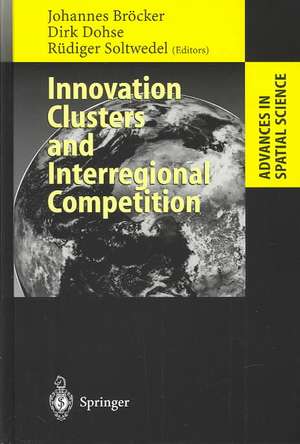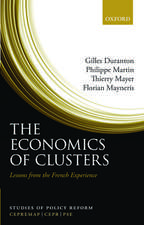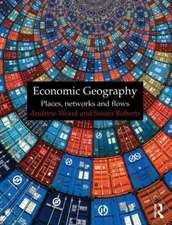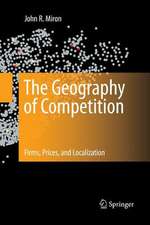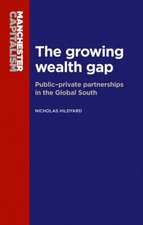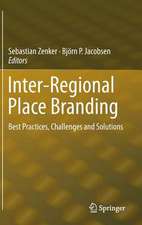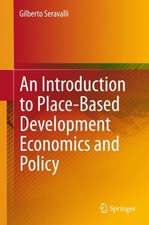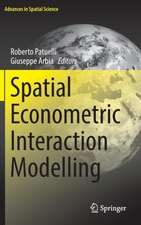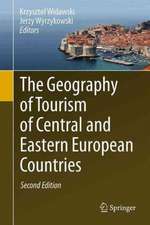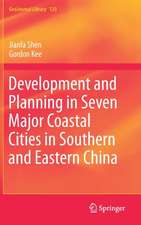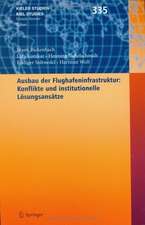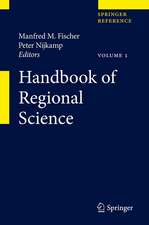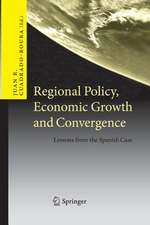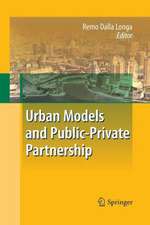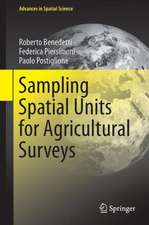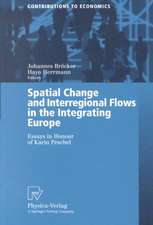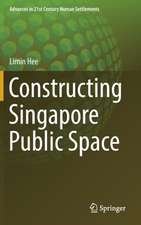Innovation Clusters and Interregional Competition: Advances in Spatial Science
Editat de Johannes Bröcker, Dirk Dohse, Rüdiger Soltwedelen Limba Engleză Hardback – 17 iun 2003
| Toate formatele și edițiile | Preț | Express |
|---|---|---|
| Paperback (1) | 950.52 lei 6-8 săpt. | |
| Springer Berlin, Heidelberg – 8 dec 2010 | 950.52 lei 6-8 săpt. | |
| Hardback (1) | 956.81 lei 6-8 săpt. | |
| Springer Berlin, Heidelberg – 17 iun 2003 | 956.81 lei 6-8 săpt. |
Din seria Advances in Spatial Science
-
 Preț: 368.92 lei
Preț: 368.92 lei - 18%
 Preț: 963.47 lei
Preț: 963.47 lei - 18%
 Preț: 948.16 lei
Preț: 948.16 lei - 18%
 Preț: 947.67 lei
Preț: 947.67 lei - 18%
 Preț: 940.72 lei
Preț: 940.72 lei - 18%
 Preț: 954.45 lei
Preț: 954.45 lei - 15%
 Preț: 646.62 lei
Preț: 646.62 lei - 18%
 Preț: 959.50 lei
Preț: 959.50 lei - 18%
 Preț: 956.33 lei
Preț: 956.33 lei - 18%
 Preț: 949.23 lei
Preț: 949.23 lei - 15%
 Preț: 646.75 lei
Preț: 646.75 lei - 15%
 Preț: 643.99 lei
Preț: 643.99 lei - 18%
 Preț: 955.40 lei
Preț: 955.40 lei - 15%
 Preț: 643.00 lei
Preț: 643.00 lei - 15%
 Preț: 644.49 lei
Preț: 644.49 lei - 18%
 Preț: 953.35 lei
Preț: 953.35 lei - 18%
 Preț: 956.03 lei
Preț: 956.03 lei - 15%
 Preț: 647.27 lei
Preț: 647.27 lei - 15%
 Preț: 638.24 lei
Preț: 638.24 lei - 18%
 Preț: 961.23 lei
Preț: 961.23 lei - 18%
 Preț: 954.93 lei
Preț: 954.93 lei - 15%
 Preț: 643.48 lei
Preț: 643.48 lei - 18%
 Preț: 955.70 lei
Preț: 955.70 lei - 15%
 Preț: 650.86 lei
Preț: 650.86 lei - 15%
 Preț: 650.04 lei
Preț: 650.04 lei - 15%
 Preț: 648.42 lei
Preț: 648.42 lei - 18%
 Preț: 949.42 lei
Preț: 949.42 lei - 18%
 Preț: 960.30 lei
Preț: 960.30 lei - 18%
 Preț: 948.29 lei
Preț: 948.29 lei - 18%
 Preț: 958.07 lei
Preț: 958.07 lei - 18%
 Preț: 950.66 lei
Preț: 950.66 lei - 18%
 Preț: 956.03 lei
Preț: 956.03 lei - 15%
 Preț: 643.65 lei
Preț: 643.65 lei - 18%
 Preț: 956.99 lei
Preț: 956.99 lei - 18%
 Preț: 958.73 lei
Preț: 958.73 lei - 18%
 Preț: 959.98 lei
Preț: 959.98 lei - 18%
 Preț: 952.40 lei
Preț: 952.40 lei - 15%
 Preț: 643.00 lei
Preț: 643.00 lei
Preț: 956.81 lei
Preț vechi: 1166.84 lei
-18% Nou
Puncte Express: 1435
Preț estimativ în valută:
183.11€ • 190.46$ • 151.17£
183.11€ • 190.46$ • 151.17£
Carte tipărită la comandă
Livrare economică 14-28 aprilie
Preluare comenzi: 021 569.72.76
Specificații
ISBN-13: 9783540009993
ISBN-10: 354000999X
Pagini: 428
Ilustrații: VIII, 412 p.
Dimensiuni: 155 x 235 x 27 mm
Greutate: 0.77 kg
Ediția:2003
Editura: Springer Berlin, Heidelberg
Colecția Springer
Seria Advances in Spatial Science
Locul publicării:Berlin, Heidelberg, Germany
ISBN-10: 354000999X
Pagini: 428
Ilustrații: VIII, 412 p.
Dimensiuni: 155 x 235 x 27 mm
Greutate: 0.77 kg
Ediția:2003
Editura: Springer Berlin, Heidelberg
Colecția Springer
Seria Advances in Spatial Science
Locul publicării:Berlin, Heidelberg, Germany
Public țintă
Professional/practitionerCuprins
1 Clusters and Competition as Engines of Innovation— An Introduction.- I: Geography and Innovation.- 2 Globalization, Innovation and the Strategic Management of Places.- 3 Regional Innovation and Learning Systems, Clusters, and Local and Global Value Chains.- 4 Networks and Technological Change in Regional Clusters.- 5 How and Why Does the Efficiency of Regional Innovation Systems Differ?.- II: The Anatomy of Clusters.- 6 Regional Clusters: What We Know and What We Should Know.- 7 The Demography of Clusters—Findings from the Cluster Meta-Study.- 8 Drivers of Economic Growth: The Role of Innovative Clusters.- III: Identifying Agglomeration Economies.- 9 Productivity and the Density of Regional Clusters.- 10 The Agglomeration Wage Differential Reconsidered: An Investigation Using German Micro Data 1984–1997.- 11 Skills and Clusters.- IV: The Role of Institutions.- 12 Corporate Governance of Cluster Development Agencies: The Case for Market Orientation.- 13 Unions, Innovation and Scale.- 14 Big Government in a Small World: The Effect of Public Expenditure on Economic Growth.- 15 Economic Innovations Depend on Political Innovations: On Deregulating the Political Process.- V: Cluster-based Innovation Policies.- 16 Territorial Competition: Lessons for (Innovation) Policy.- 17 New Firms, Regional Development and the Cluster Approach— What Can Technology Policies Achieve?.- 18 Taking Regions Seriously: Recent Innovations in German Technology Policy.- List of Figures.- List of Tables.- List of Contributors.
Recenzii
From the reviews:
"This book represents an outgrowth from a 2001 international workshop on ‘innovation clusters and interregional competition’ … . students of cluster-based economic development will find plenty of interesting material in this book. … I rarely buy books these days, especially edited collections. However, I would probably make an exception for this piece. There is a good mix of theoretical, conceptual, empirical, and analytic perspectives … . In short, this is one of the better edited collections I have seen in many years." (Alan MacPherson, Growth & Change, Vol. 35 (2), 2004)
"This book represents an outgrowth from a 2001 international workshop on ‘innovation clusters and interregional competition’ … . students of cluster-based economic development will find plenty of interesting material in this book. … I rarely buy books these days, especially edited collections. However, I would probably make an exception for this piece. There is a good mix of theoretical, conceptual, empirical, and analytic perspectives … . In short, this is one of the better edited collections I have seen in many years." (Alan MacPherson, Growth & Change, Vol. 35 (2), 2004)
Textul de pe ultima copertă
Advances in Spatial Science
This series of books is dedicated to reporting on recent advances in spatial science. It contains scientific studies focusing on spatial phenomena, utilising theoretical frameworks, analytical methods, and empirical procedures specifically designed for spatial analysis. The series brings together innovative spatial research utilising concepts, perspectives, and methods with a relevance to both basic science and policy making. The aim is to present advances in spatial science to an informed readership in universities, research organisations, and policy-making institutions throughout the world.
The type of material considered for publication in the series includes:
- Monographs of theoretical and applied research in spatial science;
- State-of-the-art volumes in areas of basic research;
- Reports of innovative theories and methods in spatial science;
- Tightly edited reports form specially organised research seminars.
Manuscripts must be prepared in accordance with the guidelines for authors and editors that may be obtained from Springer-Verlag. Manuscripts considered for the series will be reviewed by independent experts to ensure their originality, scientific level, and international policy relevance.
This series of books is dedicated to reporting on recent advances in spatial science. It contains scientific studies focusing on spatial phenomena, utilising theoretical frameworks, analytical methods, and empirical procedures specifically designed for spatial analysis. The series brings together innovative spatial research utilising concepts, perspectives, and methods with a relevance to both basic science and policy making. The aim is to present advances in spatial science to an informed readership in universities, research organisations, and policy-making institutions throughout the world.
The type of material considered for publication in the series includes:
- Monographs of theoretical and applied research in spatial science;
- State-of-the-art volumes in areas of basic research;
- Reports of innovative theories and methods in spatial science;
- Tightly edited reports form specially organised research seminars.
Manuscripts must be prepared in accordance with the guidelines for authors and editors that may be obtained from Springer-Verlag. Manuscripts considered for the series will be reviewed by independent experts to ensure their originality, scientific level, and international policy relevance.
Caracteristici
This book improves the knowledge and understanding of the reasons why, how and where innovation clusters emerge, as well as the factors determining their respective success or failure The world's leading experts contribute to our understanding of regional innovation, cluster formation and the factors influencing regional productivity and innovative performance Includes supplementary material: sn.pub/extras
